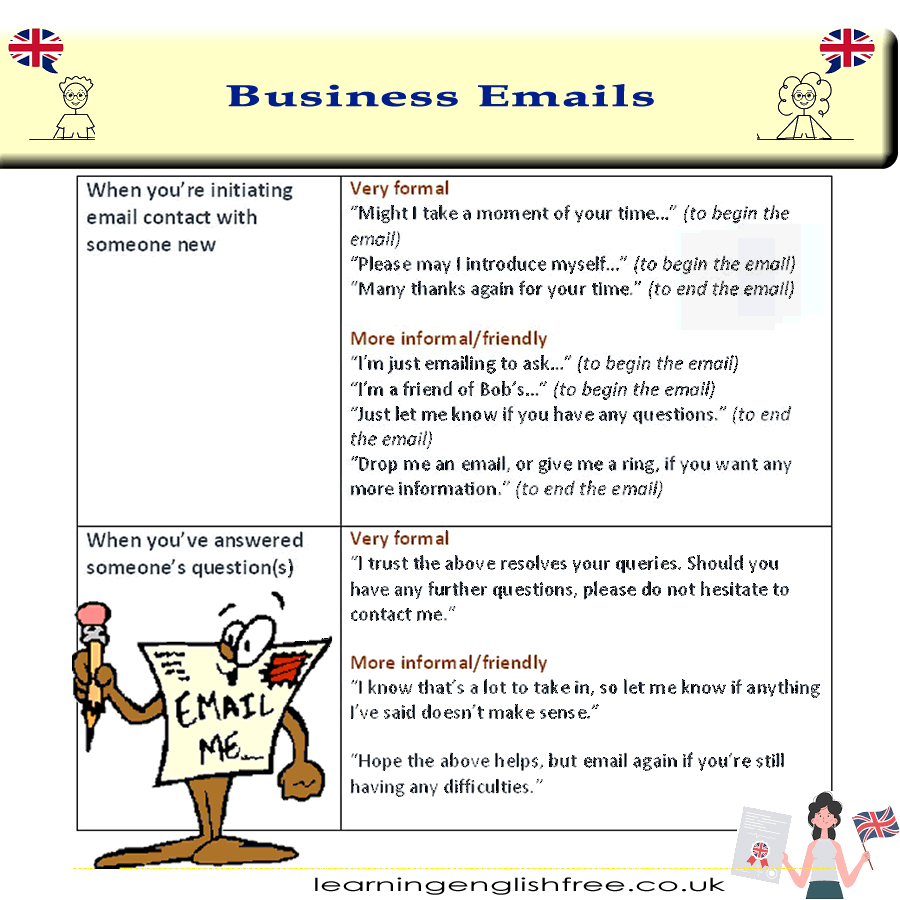
Introduction to Effective Business Email Communication
In today's digital age, email remains a fundamental mode of professional communication. This lesson focuses on crafting effective business emails, distinguishing between formal and informal tones, and understanding the appropriate context for each. By mastering these skills, learners will enhance their ability to communicate professionally and efficiently in the business world.
Learning Objectives:
- Identify the differences between formal and informal email tones.
- Learn key phrases for starting and concluding business emails.
- Apply best practices for responding to inquiries and initiating contact.
Guidelines for Business Emails
Initiating Email Contact
Very Formal:
- Begin with: "Might I take a moment of your time..." or "Please may I introduce myself..."
- Conclude with: "Many thanks again for your time."
More Informal/Friendly:
- Start with: "I'm just emailing to ask..." or "I'm a friend of Bob's..."
- End with: "Just let me know if you have any questions." or "Drop me an email, or give me a ring, if you want any more information."
Responding to Questions
Very Formal:
- "I trust the above resolves your queries. Should you have any further questions, please do not hesitate to contact me."
More Informal/Friendly:
- "I know that's a lot to take in, so let me know if anything I've said doesn't make sense."
- "Hope the above helps, but email again if you're still having any difficulties."
Example of a Finished Business Email
Formal Email Example
Subject: Introduction and Inquiry Regarding Your Consulting Services
Dear Mr. Smith,
Might I take a moment of your time to introduce myself? My name is Jane Doe, and I am the Operations Manager at XYZ Corporation. I have recently come across your consultancy firm's impressive portfolio and am keen to discuss how your services could benefit our upcoming project.
Our team is exploring options for integrating more sustainable practices into our operations, and your expertise in environmental consulting caught our attention. Could you please provide more information on how you have assisted similar companies in the past?
Many thanks again for your time and consideration. I look forward to the possibility of working together.
Best regards,
Jane Doe Operations Manager, XYZ Corporation
Conclusion and Takeaways
Today's lesson on business emails equips you with the tools necessary for professional and effective email communication. Whether you're initiating contact or responding to inquiries, understanding the balance between formal and informal tones is crucial. Remember:
- Choose your tone based on the relationship with the recipient and the context of your message.
- Use the provided phrases to start and conclude your emails appropriately.
- Practice writing emails in both tones to enhance your versatility in professional communication.
Visual aids like charts categorizing phrases by tone and context can help you recall which to use and when. Keeping notes or templates handy can also streamline your email writing process.
For more insights and support, share this platform with colleagues and visit our Facebook page at www.facebook.com/learningenglishfree.co.uk. Engage with our community for further learning opportunities and to refine your business communication skills.
